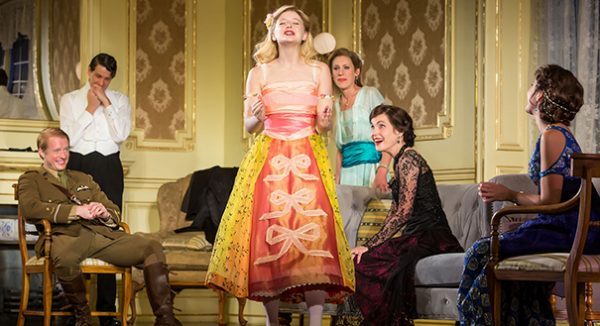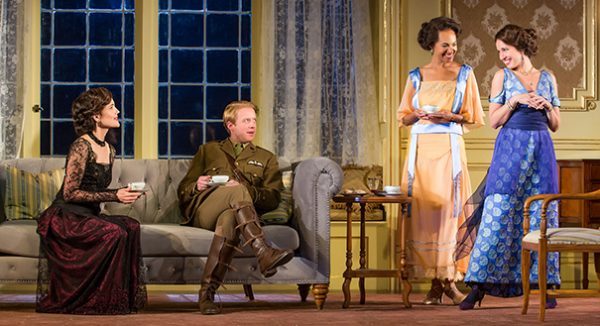
Carol (Anna Baryshnikov) entertains her family in revival of J. B. Priestley’s Time and the Conways (photo by Jeremy Daniel)
American Airlines Theatre
227 West 42nd St. between Broadway & Eighth Ave.
Run ended November 26
212-719-1300
www.roundabouttheatre.org
“A novel or a play cannot really be about Time. (And I ask the reader to remember that I am a man who is widely credited with having written ‘Time plays,” although I never made any such claim myself),” British playwright J. B. Priestley wrote. “Time is a concept, a certain condition of experience, a mode of perception, and so forth; and a novel or a play, to be worth calling one, cannot really be about Time but only about people and things that appear to be in Time.” Among Priestley’s Time plays are An Inspector Calls, I Have Been Here Before, and Time and the Conways, which was just revived by the Roundabout at the American Airlines Theatre on Broadway. As the title implies, Time is like a character unto itself in the show, which begins in 1919, shortly after the end of WWI. The Conways, led by their widowed matriarch (Elizabeth McGovern), are celebrating the twenty-first birthday of Kay Conway (Charlotte Parry), an aspiring novelist. The family is immersed in a game of Charades, which is going on in another, unseen room. Among those participating are Kay’s sisters, Hazel (Anna Camp), Madge (Brooke Bloom), and Carol (Anna Baryshnikov); their brothers, dullard Alan (Gabriel Ebert) and the swashbuckling Robin (Matthew James Thomas); and family friend Joan Helford (Cara Ricketts). They are soon joined by their solicitor, Gerald Thornton (Alfredo Narciso), and his odd pal, a businessman named Ernest Beevers (Steven Boyer), who has a creepy liking for Hazel. (“Ugh. I’d just as soon marry a — a ferret,” Hazel tells Joan.) The word they are trying to convey to their guests is “pussyfoot,” which, appropriately enough, means to evade commitment, emblematic of how the Conways avoid facing reality. “Just when everything is very jolly and exciting, I suddenly think of something awfully serious, sometimes horrible — like Dad drowning — or that little mad boy I once saw with the huge head — or that old man who walks in the Park with that great lump growing out of his face,” Carol says, to which Hazel responds, covering her ears, “I’m not listening. I’m not listening.” Mrs. Conway essentially covers her ears when Beevers advises that she accept a generous offer for her house, but the family will have none of it.

A family refuses to face harsh realities in Roundabout Broadway revival (photo by Jeremy Daniel)
When Mrs. Conway says, “I’m not used to happiness,” she’s not kidding, but she’s also not about to do much to change things and face reality. The play then shifts to 1937, as the Conways all have to deal with the decisions they’ve made, most of which have not been for the better. The stern Madge, explaining that she has come to the house just because she was in the neighborhood, tells Kay, “I’ve no further interest in these family muddles, financial or otherwise.” When Gerald is about to deliver some bad news, Kay complains, “When you turn on that legal manner, I can’t take you seriously — I feel you’re still acting in one of our old charades.” But it’s the Conways who can’t come to terms with what his happening. The third act returns to 1919, picking up just where act one left off, cleverly filling in some holes to explain how things got to where they were eighteen years later. Time and the Conways, which is rarely revived and has been made into a film twice, a 1984 Russian drama and a BBC version starring Claire Bloom, is reminiscent of the Roundabout’s 2013 expert production of Terence Rattigan’s The Winslow Boy, which also ran at the American Airlines Theatre and dealt with a family facing a dilemma. Priestley’s play also evokes elements of Anton Chekhov’s The Cherry Orchard and Jane Austen’s Pride and Prejudice as the Conways face an uncertain future they’d rather not think about. The ten-person cast is superb, with precise, confident direction by rising star Rebecca Taichman (Indecent, Familiar) on Neil Patel’s engaging drawing-room set. Frank Ventura is credited with etiquette and period movement, which is appropriately proper. “Some novelists and dramatists may be unusually aware of Time, but they have to write about something else,” Priestley explained. In Time and the Conways, he has done just that in telling the fateful story of a dysfunctional family that refuses to look in the mirror.